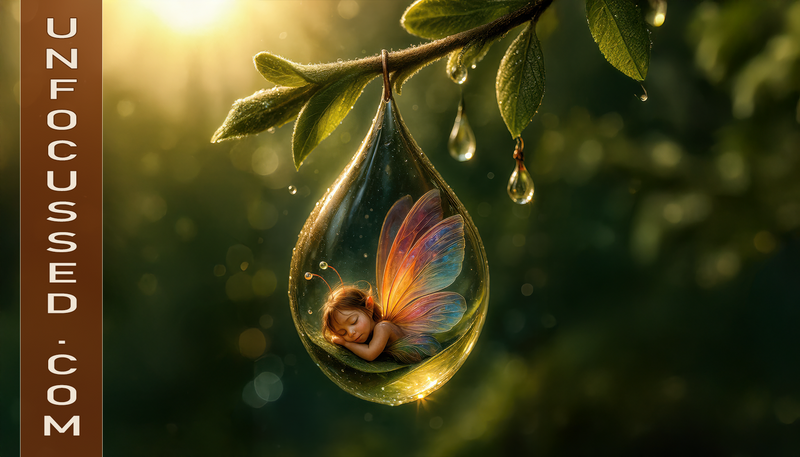The Quiet Between the Wings
In a forest untouched by cartographers and unspoiled by time, there was a girl who never spoke. She had not always been silent, but the world had grown so loud that her words got drowned somewhere between the sigh of the wind and the cracks in her mother’s voice. Her name, if she remembered it at all, was buried deep beneath layers of moss and memory.
Each morning, she rose with the dew. Bare feet kissed the earth as she wandered beneath towering trees, her copper curls collecting leaves and whispers. She belonged to no one. Not the village that once branded her too strange, too solemn. Not the couple who had left her in that village like a forgotten coat. She belonged only to the stillness of the woods, and to the owls who kept watch in the canopy above.
The first owl came to her the day she stopped crying. She had been crouched beside a frozen stream, too tired to grieve, too numb to care, when she heard the rustle of wings. A tawny owl landed silently beside her, its amber eyes unblinking. It did not coo or tilt its head like in the stories. It simply was, as if summoned by grief itself. The girl, for reasons she couldn’t name, held out her wrist—and the owl climbed on like it had always belonged there.
They grew up together, the girl and the owl. They never named each other. He brought her the stillness she had craved, and she offered warmth to the nights when the forest howled. Villagers whispered about her. “Witchling,” they said. “Cursed child.” One claimed she turned into an owl herself by moonlight, but no one dared get close enough to prove it. Eventually, the gossip grew stale and faded like the path into the woods.
Years passed, marked only by the growth rings in the trees and the new strands of silver in the owl’s feathers. The girl, now nearing womanhood, spoke only in glances and gestures. But to the owl, she gave all her words, every last one she’d never dared to say aloud. He listened. Owls are good at that—listening without interrupting, judging, or fixing. The kind of listening most people forget to practice once they grow up.
It was on the eve of the longest night, as the frost clung to the last shivering leaves, that the owl began to fail. His wings no longer lifted him as high. His eyes lost their fire. And the girl—no longer a girl, but something softer and stronger—realized that she would have to prepare for his leaving. But how do you prepare to lose the only creature who ever truly heard you?
She built him a nest near the edge of the glade, lined with her coat and bits of yarn she unraveled from her skirts. She fed him berries, warmed his fragile body with her own, and read aloud the stories she’d once scrawled on tree bark. For the first time in years, her voice returned—raspy, unsure, but real. And the owl blinked slowly, his head tucked beneath her chin, as if to say, Keep speaking. Even when I’m gone.
On the solstice morning, he did not wake.
The girl did not cry. Instead, she sat with him for hours, until the mist thinned and the light broke gently through the trees. And when she finally stood, cradling his body to her chest, the forest felt smaller. Or maybe she had simply grown.
She began to walk, her boots stirring the frost-bitten ferns, toward a place she had never dared to go before—the edge of the woods.
The Language of Ash and Feather
She didn’t bury him. She couldn’t. The idea felt wrong—final in a way that her soul wasn’t ready for. So she burned sage and pine resin in a circle of smooth stones and laid him in the heart of it. When she set the flame, it didn’t crackle or roar. It whispered. It whispered like the rustle of wings in the early morning fog, like a goodbye that sounded suspiciously like “you already know the way.”
When the smoke rose, she didn’t watch it go. She turned and walked. There was no trail, only instinct. Past the tree she had once named “Mother” for its bent arms. Past the stone she had bled on once, during a tantrum she never quite forgave herself for. Past the spring where she had imagined drowning, before the owl sat beside her and changed everything by saying nothing.
She emerged at the edge of the forest on the third day, barefoot and unblinking. Before her sprawled a field of dead wheat, bent and yellowed from the frost. A lonely dirt road stretched through it like a scar. The village was visible in the distance, all wood smoke and pale rooftops. She hesitated—not out of fear, but because her heart had grown so used to silence it wasn’t sure how to beat among noise again.
The first person she met was a boy. Not a boy in the way children are—this one was all calluses and smoke-stained teeth, wearing a cap that no longer fit and a shirt that probably had never fit to begin with. He was piling wood beside the road. She said nothing. He looked up. His eyes widened as if he’d seen a ghost.
“You’re the owl girl,” he said, and she flinched.
She nodded. He tilted his head and squinted like he was trying to see her properly for the first time. “They said you ate squirrels raw. That your eyes glowed at night.” He said it like he half believed it, half hoped it.
“I listened,” she said. Her voice startled even her. It cracked like thawing ice.
He blinked. “What?”
She stepped forward. “That’s all. I listened.”
He opened his mouth to ask more, but she kept walking. She wasn’t ready to be examined like a relic. Not yet. But the words had been spoken, and something inside her loosened—a knot that had waited too long to unravel.
She stayed at the edge of the village that winter, in a shack that had once housed bees and now housed drafty air and ghosts of honey. She fixed it up with twine, bone, bark, and a rhythm that echoed in her spine. People brought her things, mostly in silence: scraps of bread, tattered coats, herbs. No one asked for payment. They just… left them. And she took them. It was a barter of presence. She understood that.
Children were the first to draw close. They asked about the owl. She didn’t give them fairy tales. She told them the truth—that he had been quiet and old and soft, and that he had once watched her weep for three straight days without flinching. That sometimes love doesn’t look like comfort. It looks like staying. They didn’t always understand, but they listened, wide-eyed, as if her voice contained something worth keeping.
Then came the mothers. Women with bruises that weren’t visible. Women who were tired of their own echoing kitchens. They came under the guise of “just walking by,” and left with tears that surprised them. They brought jars of soup, hand-stitched gloves, dried lavender. One gave her an old book of bird calls. Another, an owl feather she found lodged in her doorframe. Each gift was less about generosity and more about recognition.
They didn’t call her witch anymore. They called her “the feather girl” or “the owl’s widow.” Names softened by grief and myth.
Spring arrived with a violence that made her ache. Buds burst open like secrets too long held. The air smelled like apology. She planted seeds outside the shack. Not because she needed food, but because she missed watching something grow.
One day, a stranger arrived—older, heavy with years and woodsmoke. His name was Tam. He had been a carpenter, once. Now he whittled things he didn’t need, just to remember what it felt like to make something from nothing. He asked if he could fix her door hinge. She nodded. He came back the next day and replaced the entire frame. They didn’t speak much, but there was comfort in his presence. He reminded her of the owl—not in appearance, but in wayness. He took up space gently.
It was Tam who finally asked, “Did you love him?”
She blinked. “The owl?”
He smiled like he already knew the answer. “Yes.”
She looked down at her hands. They were covered in dirt and pine resin and tiny scars from sharp seeds. “Yes,” she said. “But not the way people love people. He was… the first place I ever felt known.”
Tam nodded. “That counts.”
She stared at him, then did something she hadn’t done in years. She touched his shoulder. “You listen, too.”
He looked away. “I used to talk too much. Now I know better.”
That night, she sat outside and stared at the moon, and for the first time in a long while, didn’t feel like something vital was missing. The owl was gone. But the listening? That remained. In Tam. In the children. In the broken women who brought her nettle tea and sobbed without asking for permission.
She realized then that what the owl had taught her wasn’t just how to be still. It was how to be present. To witness. And sometimes, witnessing was the greatest gift you could offer. Sometimes, it was enough to save a life.
The wind rustled the trees that night in a way that almost sounded like wings. She didn’t look up.
She simply said, “Thank you.”
And went to sleep for the first time without dreaming of his weight on her wrist.
The Ones Who Stayed Quiet
Years passed, as years do—stealthily, like foxes in fog. The forest did not reclaim her, though it waited patiently at her back. It sent birds to visit. It sent strange mushrooms in spring. But she had rooted herself in something new—not people, not walls, but witnessing. The small act of noticing had become her ministry. And eventually, others came who needed to be noticed too.
They didn’t arrive with fanfare. They never do. A man who hadn’t spoken since the war showed up one day with cracked boots and eyes that refused to settle. A girl who trembled if someone touched her sleeves brought berries in a paper pouch. A mother whose hands shook so badly she could no longer sew brought only her silence—and it was enough.
The girl—now a woman, though no calendar had told her when the shift occurred—opened her space to them. Not like a priestess. Not like a healer. Simply like someone who had once sat in the cold long enough to appreciate company that didn’t ask too many questions.
They built benches together from old fence posts. They grew herbs that didn’t sell in markets but were good for heartbreak, digestion, and memory. They learned to leave space in conversations for breath, for fear, for stories that had no tidy arc. They did not call it therapy. They called it “sitting.” Sometimes, “watching the wind.”
Each night, she lit a candle in her window. Not to summon, but to say, “Someone is still here.” Some nights, no one came. Some nights, someone did. A widow who’d never remarried. A shepherd boy who saw ghosts. A woodcutter who couldn’t read but who carved owls from every fallen branch.
She never taught them how to speak. She taught them how to listen. And slowly, in the rhythm of moss and moonlight, they learned to listen to themselves again. It was not fast work. Healing never is. It is not a firework but a candle—a slow burn that flickers, falters, and refuses to be rushed.
One day, she found herself teaching a child how to sit still. The child had too many questions and even more twitches. She didn’t silence them. She simply sat beside them and spoke the owl’s name—the one she had never spoken before.
“Kess,” she said softly, like a prayer, like an offering.
The child paused. “What’s that mean?”
She smiled. “Everything I didn’t say. Everything he already knew.”
The child blinked, uncertain. But they didn’t ask again. They listened. And the woman knew then that the owl’s work—their work—was not done. It had only changed shape. Grown legs. Learned to walk on new soil.
Years later, long after her hair silvered and her fingers bent like tree roots, she sat again beneath the tree she had once named “Mother.” It had grown hollow at the base, but strong above. A perfect metaphor, she thought. You can lose your core and still keep reaching for light.
The villagers still whispered about her, but now with reverence. “She’s the one who listens,” they said. “Go to her if the noise gets too loud.” Her name was etched in no book. No altar bore her likeness. But in the hush between wind and water, in the eyes of quiet people who had once felt broken—she was known.
One autumn, when the leaves fell faster than she could count them, she woke up and knew it was time. Not of death. But of return. She left a note. Not in ink, but in stones along the path. A line of feathers on the doorstep. A single candle flickering in daylight. The signs were enough.
They found her coat folded on the bench. Her boots neatly side by side. Her walking stick rested against the tree as if waiting for someone else to need it.
But she? She was gone. No struggle. No storm. Just absence—the kind that feels more like presence turned sideways.
And though no one saw them, those who knew how to look swore they caught sight of a tawny owl circling high above the trees. Not flying alone.
Some souls find their way back home not by noise, but by stillness.
And the forest listened.
Take Her Story Home
If the stillness of her journey touched your heart, you can carry a piece of it with you. We've transformed The Girl Who Listened to Owls into a collection of beautiful, high-quality products that honor the quiet strength of her story. Let the tale continue in your space — whether on your wall, in your hands, or wrapped gently around your shoulders.
- ✨ Acrylic Print – A striking, luminous display of the image in rich detail (link opens in new tab/window)
- 🌲 Wood Print – For a natural, rustic finish as timeless as the tale (link opens in new tab/window)
- 🧩 Jigsaw Puzzle – Piece together her journey, one quiet moment at a time (link opens in new tab/window)
- 🦉 Fleece Blanket – Wrap yourself in warmth, story, and serenity (link opens in new tab/window)
All available now at shop.unfocussed.com (link opens in new tab/window).





















































